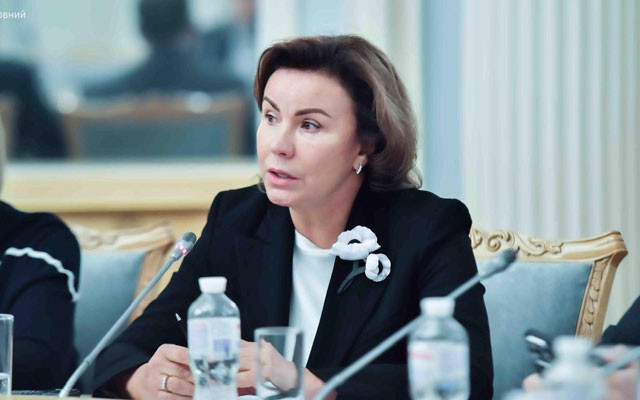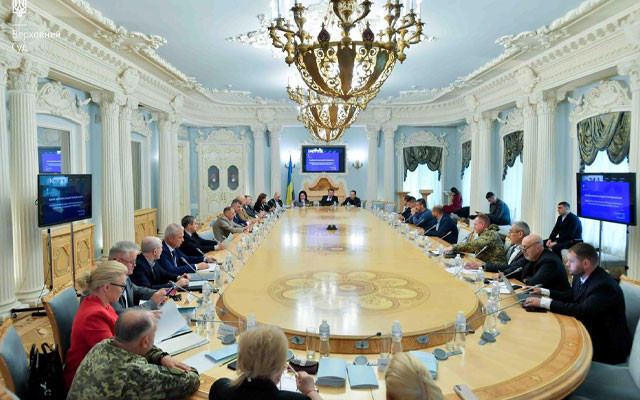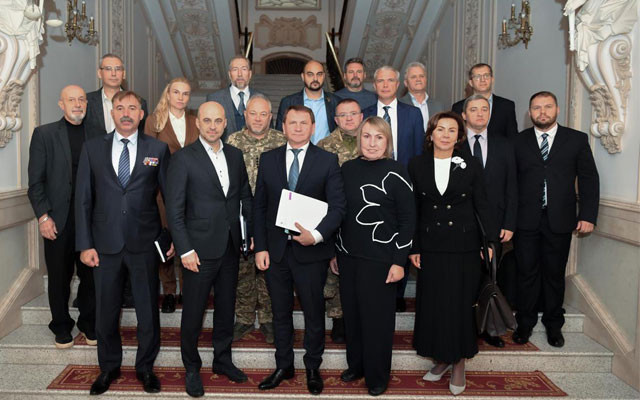
Don't restore, create: Marina Stavniychuk on military courts in Ukraine



In Ukraine, it is not worth «restoring» military courts in the form in which they existed before 2010, as this contradicts the Constitution and European standards. It is necessary to create an independent model that will meet democratic standards, guarantee the independence of judges, and protect the rights of military personnel.
This opinion was expressed by the chairman of the Committee on the rule of law of the Ukrainian National Bar Association, member of the Venice Commission (2009–2013) Marina Stavniychuk during the last meeting of the working group of the Scientific advisory council at the Supreme Court.
The event, which brought together Supreme Court judges, leading Ukrainian scholars, representatives of parliament, the Office of the President, representatives of the prosecutor's office, advocacy, military authorities, and international experts, was devoted to the analysis and discussion of draft laws:
- No. 13048 of 27.02.2025 «On amendments to the law of Ukraine «On the judicial system and status of judges» regarding the functioning of military courts»;
- No. 13048-1 of 11 March 2025 «On amendments to the law of Ukraine «On the judicial system and status of judges» regarding the creation and organisation of military courts».
Both draft laws are aimed at restoring the functioning of military courts in Ukraine to ensure the high-quality administration of justice in the military sphere, effective and expeditious proceedings against military personnel for offenses committed, and judicial protection of the violated rights and legitimate interests of military personnel, their family members, and veterans.
M. Stavniychuk recalled the history of military courts. Until 2001, there was a system of military courts: garrison courts, appellate courts, and the military collegium of the Supreme Court of Ukraine. In 2001, in connection with judicial reform, the Law on the judicial system of Ukraine was adopted, which provided for the gradual elimination of military courts. In 2010, the process was completed and military courts ceased to exist as a separate system, and cases that were subject to the jurisdiction of these judges were transferred to civil courts of general jurisdiction.
«The goal of eliminating military courts in Ukraine at that time was Ukraine's desire to meet European standards of justice and harmonize the judicial system with European standards and best practices, where military courts are considered unnecessary in peacetime, - explained the chairman of the UNBA Committee. - Ultimately, Ukraine's goal was to avoid parallel justice for the military and to form a unified justice system. The Europeans' demands were strict, and we fulfilled them».
According to M. Stavniychuk, it is impossible to restore military courts in Ukraine to their original form as they existed in previous periods, based on the Constitution and European standards in the field of justice. «We must understand that all initiatives in the field of military justice will be evaluated by the Venice Commission as the main expert body of the Council of Europe and the European Union, - she warned. - Ukraine cannot ignore the best practices that exist primarily in European countries».
In this regard, the representative of advocacy cited examples of different models of military courts in Europe. For example, Italy, Greece, and Poland have a complete system of military courts with their own courts of first instance, appellate courts, and corresponding chambers in the supreme courts. They consider not only military crimes and disciplinary violations, but also serious criminal cases involving military personnel.
In other countries, such as France, Spain, and the United Kingdom, military courts operate with limited jurisdiction, are subject to civilian standards, or specialize in specific categories of cases.
The third approach is used in Germany, Lithuania, Latvia, Estonia, Sweden, Norway, Denmark, and Finland. In peacetime, all cases involving military personnel are heard by general courts, and military tribunals can only be reinstated in the event of war, as is the case in Germany and Norway.
According to M. Stavniychuk, Ukraine should not talk about restoring the old system, but about creating its own model of military courts. This could be a full-fledged structure following the example of Poland or Italy, or a mixed model similar to the British one, where military cases are heard by specialized courts, but according to the standards of general jurisdiction. She emphasized the need to develop a comprehensive concept for the creation of military courts and legislative regulation of their activities, which would guarantee effective, fair, and swift justice. The task of such a model is not only to ensure law and order in the Armed Forces, but also to comply with international standards and adequately protect the rights of military personnel and their families. «The provisions of Article 125 of the Constitution, which refers to the principles of territoriality and specialization in the formation of the judicial system, must be observed, and the independence and inviolability of judges, guaranteed by Article 126 of the Constitution and laws, must be ensured. Also, in the administration of justice, the basic principles and foundations of judicial proceedings must be observed in accordance with Article 129 of the Constitution», - the advocate explained.
In addition, M. Stavniychuk warned against the idea of granting judges exclusively military status or subordinating them to military command. Such an approach, she said, directly contradicts the standards of judicial independence guaranteed by Article 6 of the Convention for the protection of human rights and fundamental freedoms. She recalled that the European Court of Human Rights has repeatedly emphasized in its practice that a court with military status and dependence on the command cannot be considered independent and impartial.
Along with the issue of creating military courts, the representative of the UNBA outlined the need to form a broader system of military justice. This involves the creation of a military police force as the body responsible for pre-trial investigations in the military sphere, as well as a military prosecutor's office, which should be integrated into a single system of prosecution and report exclusively to the Prosecutor General of Ukraine in accordance with Article 131-1 of the Constitution. She also emphasized the need to develop an institution of free legal aid for military personnel on the basis of the Ukrainian National Bar Association and to create a fully-fledged independent legal service in the Armed Forces. «Only in this form can military justice and military law work effectively and fairly in Ukraine», - concluded M. Stavniychuk.
© 2025 Unba.org.ua Всі права захищені
"Національна Асоціація Адвокатів України". Передрук та інше використання матеріалів, що розміщені на даному веб-сайті дозволяється за умови посилання на джерело. Інтернет-видання та засоби масової інформації можуть використовувати матеріали сайту, розміщувати відео з офіційного веб-сайту Національної Асоціації Адвокатів України на власних веб-сторінках, за умови гіперпосилання на офіційний веб-сайт Національної Асоціації Адвокатів України. Заборонено передрук та використання матеріалів, у яких міститься посилання на інші інтернет-видання та засоби масової інформації. Матеріали позначені міткою "Реклама", публікуються на правах реклами.